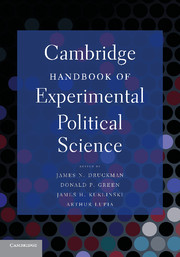Book contents
- Frontmatter
- Contents
- List of Tables
- List of Figures
- Contributors
- Acknowledgments
- INTRODUCTION
- PART I DESIGNING EXPERIMENTS
- PART II THE DEVELOPMENT OF EXPERIMENTS IN POLITICAL SCIENCE
- PART III DECISION MAKING
- PART IV VOTE CHOICE, CANDIDATE EVALUATIONS, AND TURNOUT
- PART V INTERPERSONAL RELATIONS
- 17 Trust and Social Exchange
- 18 An Experimental Approach to Citizen Deliberation
- 19 Social Networks and Political Context
- PART VI IDENTITY, ETHNICITY, AND POLITICS
- PART VII INSTITUTIONS AND BEHAVIOR
- PART VIII ELITE BARGAINING
- PART IX ADVANCED EXPERIMENTAL METHODS
- AFTERWORD
- Name Index
- Subject Index
- References
17 - Trust and Social Exchange
Published online by Cambridge University Press: 05 June 2012
- Frontmatter
- Contents
- List of Tables
- List of Figures
- Contributors
- Acknowledgments
- INTRODUCTION
- PART I DESIGNING EXPERIMENTS
- PART II THE DEVELOPMENT OF EXPERIMENTS IN POLITICAL SCIENCE
- PART III DECISION MAKING
- PART IV VOTE CHOICE, CANDIDATE EVALUATIONS, AND TURNOUT
- PART V INTERPERSONAL RELATIONS
- 17 Trust and Social Exchange
- 18 An Experimental Approach to Citizen Deliberation
- 19 Social Networks and Political Context
- PART VI IDENTITY, ETHNICITY, AND POLITICS
- PART VII INSTITUTIONS AND BEHAVIOR
- PART VIII ELITE BARGAINING
- PART IX ADVANCED EXPERIMENTAL METHODS
- AFTERWORD
- Name Index
- Subject Index
- References
Summary
Trust and its complement, trustworthiness, are key concepts in political science. Trust is seen as critical for the existence of stable political institutions, as well as for the formation of social capital and civic engagement (Putnam 1993, 2000; Stolle 1998). It also serves as a social lubricant that reduces the cost of exchange, whether in reaching political compromise (Fenno 1978; Bianco 1994) or in daily market and nonmarket exchange (Lupia and McCubbins 1998; Sztompka 1999; Knight 2001). Researchers in this area face three key challenges. First, the concept of trust has been used in a multiplicity of ways, leaving its meaning unclear. Second, it is used to refer both to trust in government and trust among individuals (interpersonal trust). Third, it is sometimes seen as a cause and sometimes as an effect of effective political institutions, leaving the causal relationship between trust and institutions unclear.
The definition of trust is muddied by the fact that two distinct research methods have been used to explore it. Early research treats trust as a perception of norms in a society, assessed using survey questions about the trustworthiness or fairness of others. For forty years, the General Social Survey (GSS), World Values Survey (WVS), and American National Election Studies (ANES) have relied on the same questions to evaluate trust. In contrast, recent research has turned to behavioral assessments of trust using incentivized, economics-style laboratory experiments; this work is the focus of this chapter.
- Type
- Chapter
- Information
- Cambridge Handbook of Experimental Political Science , pp. 243 - 257Publisher: Cambridge University PressPrint publication year: 2011
References
- 32
- Cited by

